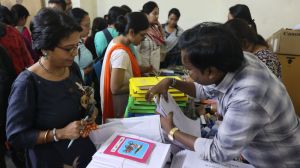SC nod to TN RSS marches: DMK leaders claim face-saver in having delayed same
BJP leader H Raja says DMK was apprehensive about "impact on minds of people", calls Supreme Court order "slap on DMK govt's face"
 Though the RSS has been organising processions in Tamil Nadu for over five decades, both the DMK as well as AIADMK governments have tried to stop permission for the same. (Express photo by Bhupendra Rana/File)
Though the RSS has been organising processions in Tamil Nadu for over five decades, both the DMK as well as AIADMK governments have tried to stop permission for the same. (Express photo by Bhupendra Rana/File) The DMK government might have lost the battle to restrict RSS route marches in Tamil Nadu, but the Sangh has a long history of tension with governments in the state.
Though the RSS has been organising processions in Tamil Nadu for over five decades, both the DMK as well as AIADMK governments have tried to stop permission for the same. Even late Chief Minister J Jayalalithaa, who had friendly relations with the BJP, in 2011 denied police permission for many RSS marches.
After the Supreme Court allowed the route marches without restrictions earlier this week, there has been silence from the DMK government’s side. The police have also started giving out permissions as sought by the RSS.
In private, DMK leaders argue that their government’s victory lies in having ensured that the processions were delayed by six months. Originally meant on October 2 Gandhi Jayanti Day last year, the marches will now be held on April 16.
Top DMK sources claim the party realised it did not have a solid ground to oppose the processions. The reasons cited by it included the “militant” nature of the processions given that RSS cadres would be holding lathis, and that there could be a threat to them from the radical Popular Front of India, which was banned last year.
Veteran BJP and RSS leader H Raja said this logic was laughable. Accusing the DMK of being apprehensive that the RSS marches would leave “a huge impact on the minds of the people”, Raja said: “Even before the order came, three district SPs gave permission for the marches and these were held. There were no violent incidents. The Supreme Court order has come as a tight slap on the face of the DMK.”
About the DMK claiming to have successfully raised obstacles in the RSS’s way, Raja said: “What is so big about a delay? As they say, ‘The marriage has taken place ultimately, hasn’t it?’.”
While far from a major source in Tamil Nadu, the BJP has been trying to gain a foothold in the state and has made some progress riding piggyback on the AIADMK.
Rejecting the DMK government’s plea, the Supreme Court Bench of Justices V Ramasubramanian and Pankaj Mithal said they found nothing wrong with the Madras High Court order allowing the rallies. On the state’s claim of law and order problems, the Supreme Court said the case it had made showed that RSS members were “victims” rather than “perpetrators”.
The legal wrangling began around September 2022, when the Tamil Nadu government first denied the RSS permission to carry out route marches in most of the 50 locations it sought. The Sangh moved the High Court, and in September 2022, a single-judge Bench of the High Court allowed the marches.
However, the government continued to hold off on permission, leading to a modified order by the High Court in November with a few restrictions on the marches. The RSS appealed against this too, and a division Bench of the Madras High Court in February removed all restrictions imposed in the November 2022 order.
In sharp observations, the court held that the state, under the guise of intelligence inputs, cannot prevent outfits with different ideologies from exercising their fundamental right to speech and expression, and directed the police to grant permission for route marches on public roads in more than 40 places in Tamil Nadu.
The DMK government then filed special leave petitions in the apex court.
A top DMK leader said the state had its reasons to object to the marches. “Such legal fights are tough when they are against a powerful organisation. But politically we are glad that we made life just a little bit harder for the RSS, delayed the marches by six months, and made it clear that men carrying out parades like that on the streets is not normal. It is not about a setback for us, because what else could the court have said?… But it was all about sending a strong message to the RSS,” the leader said.
DMK sources also point to the November 4, 2022, High Court order imposing restrictions on the RSS processions such as specifying the locations where these could be taken out and directing the marchers not to carry lathis. While the court later lifted the curbs, party leaders claim they had made their point.
Photos



- 01
- 02
- 03
- 04
- 05




























